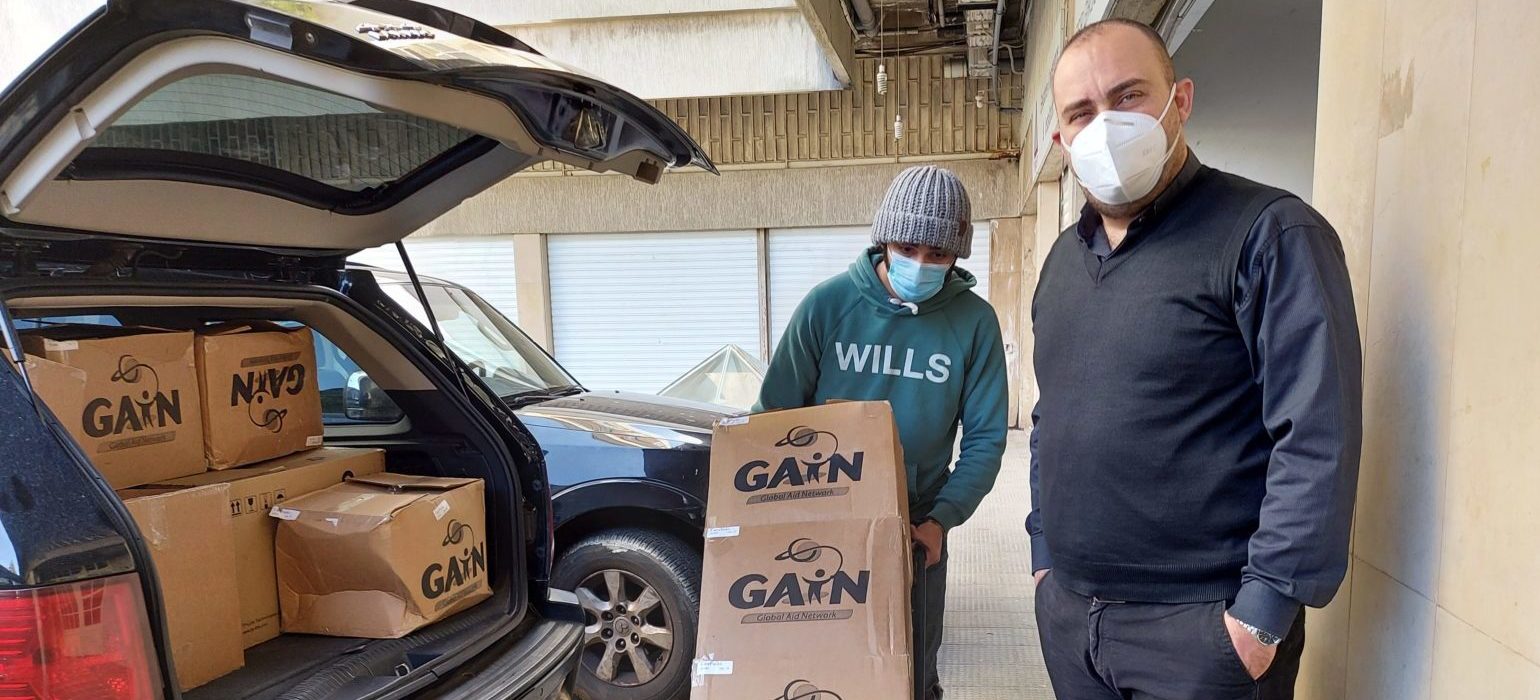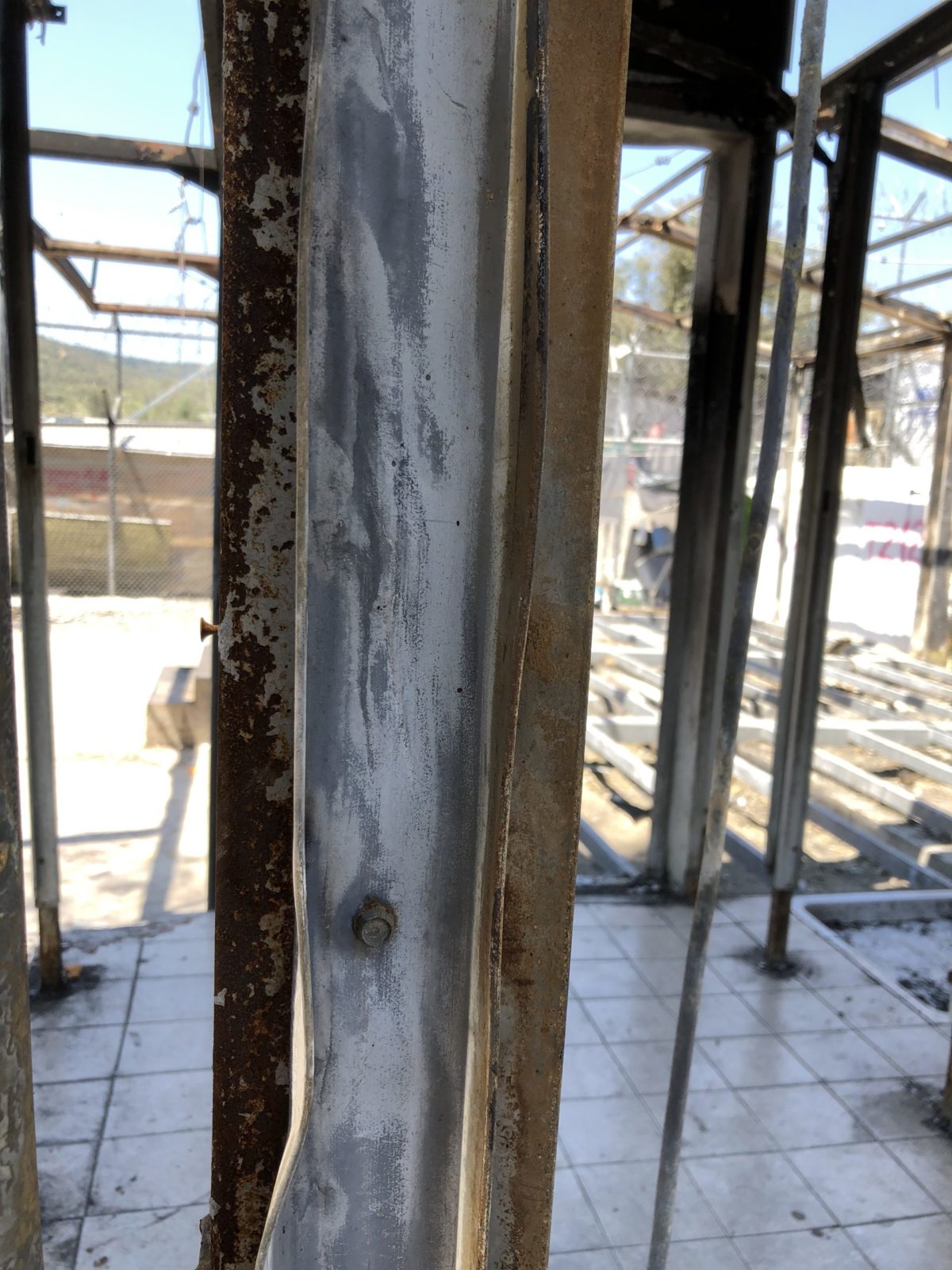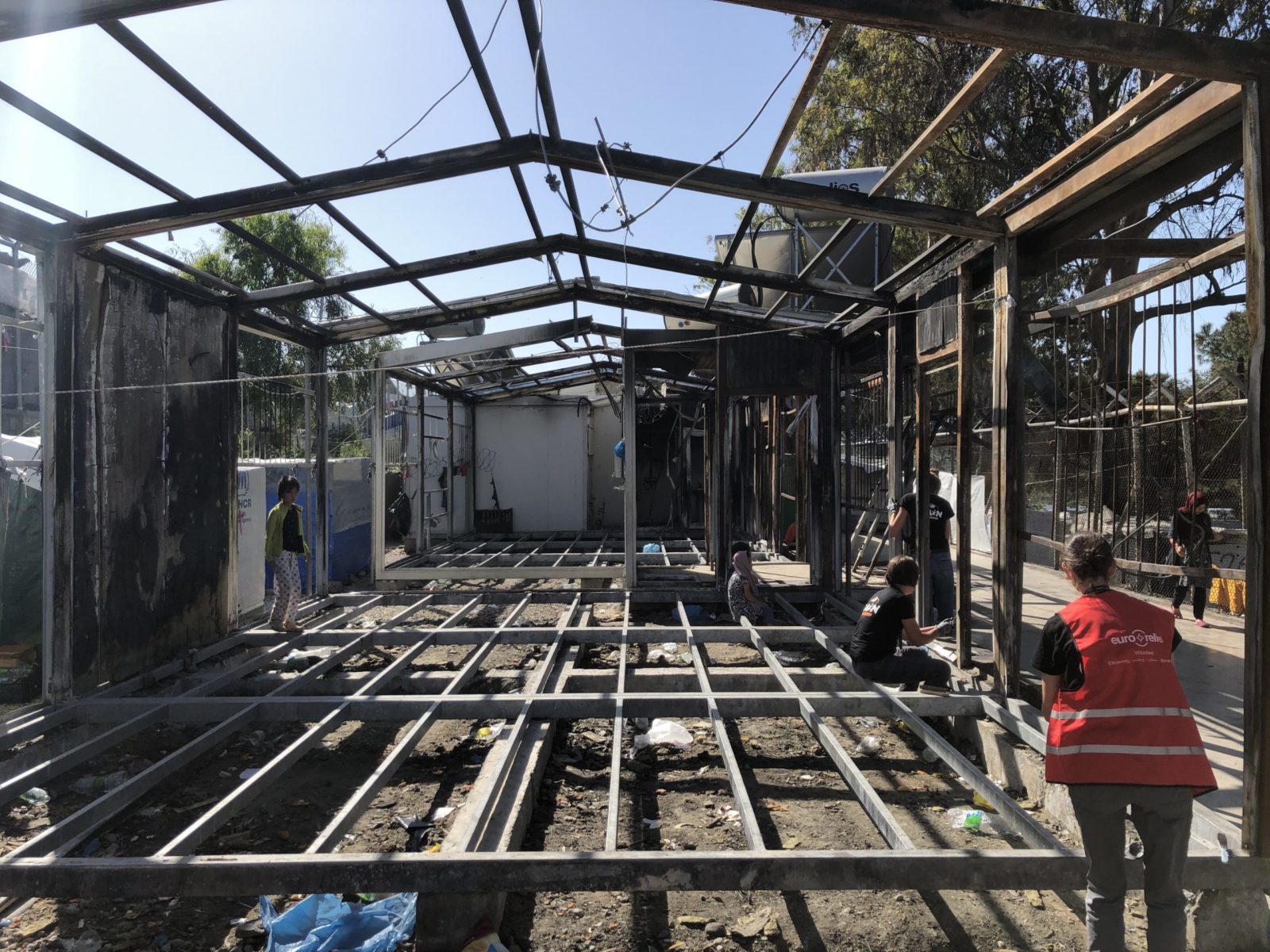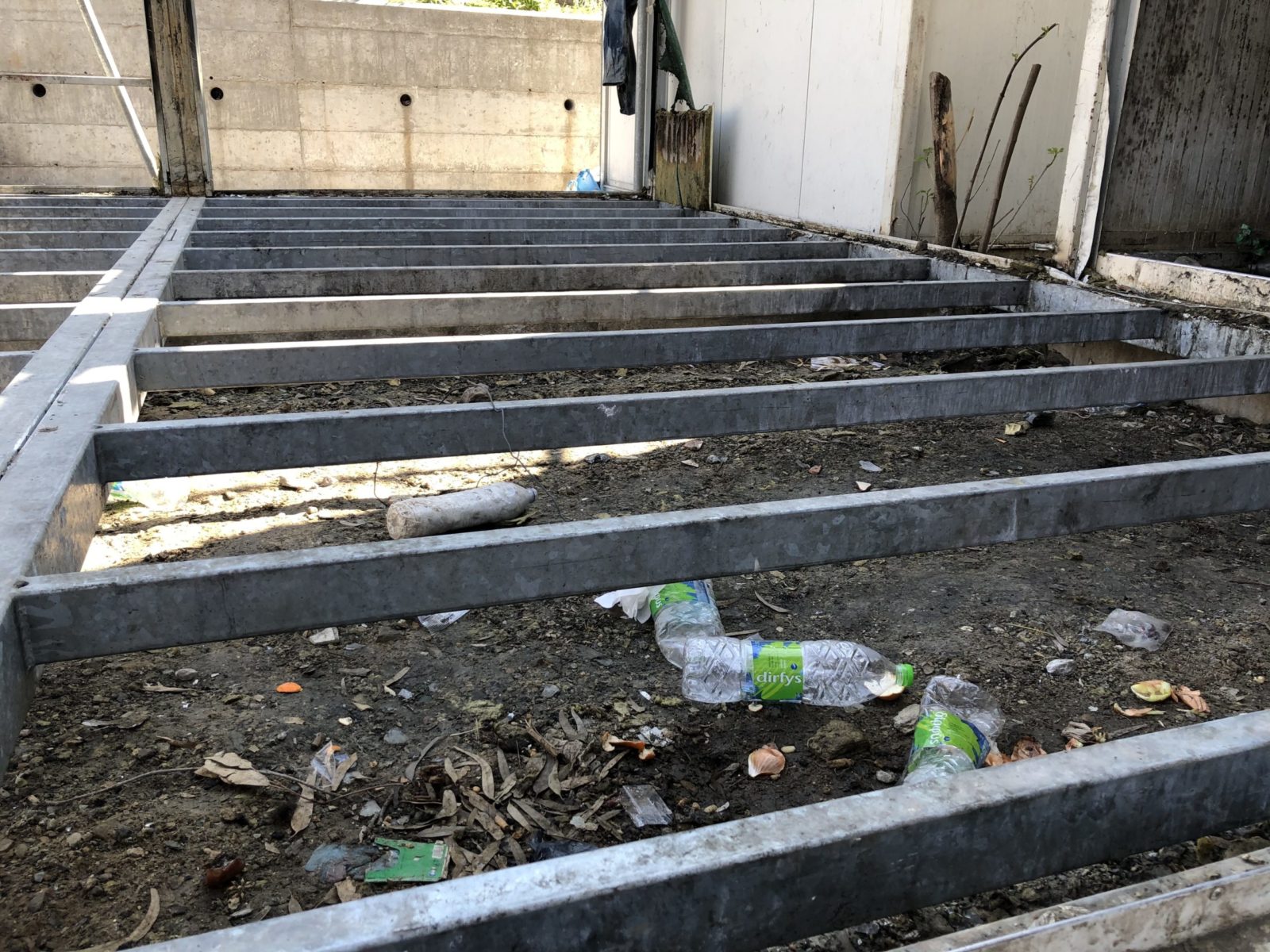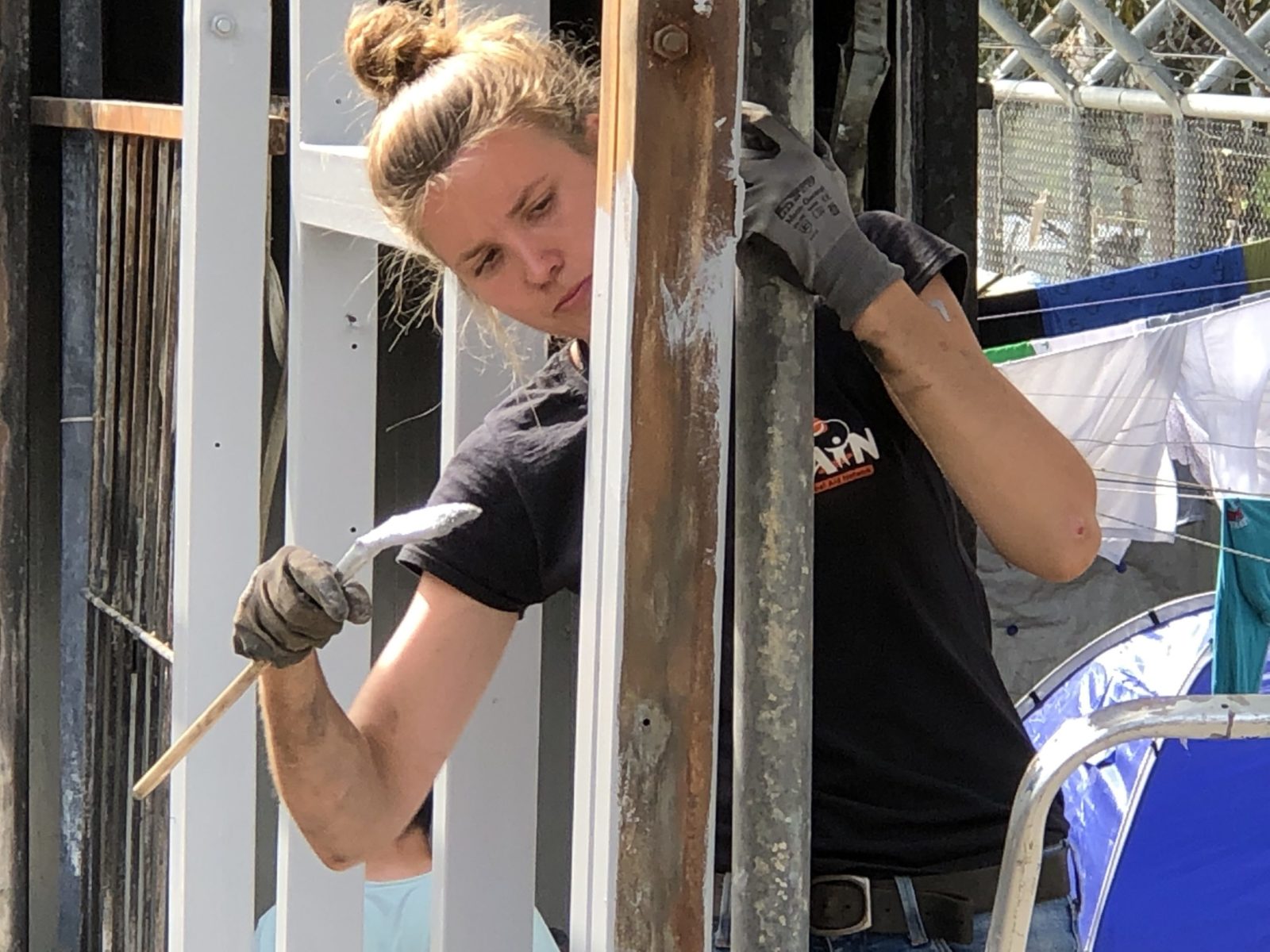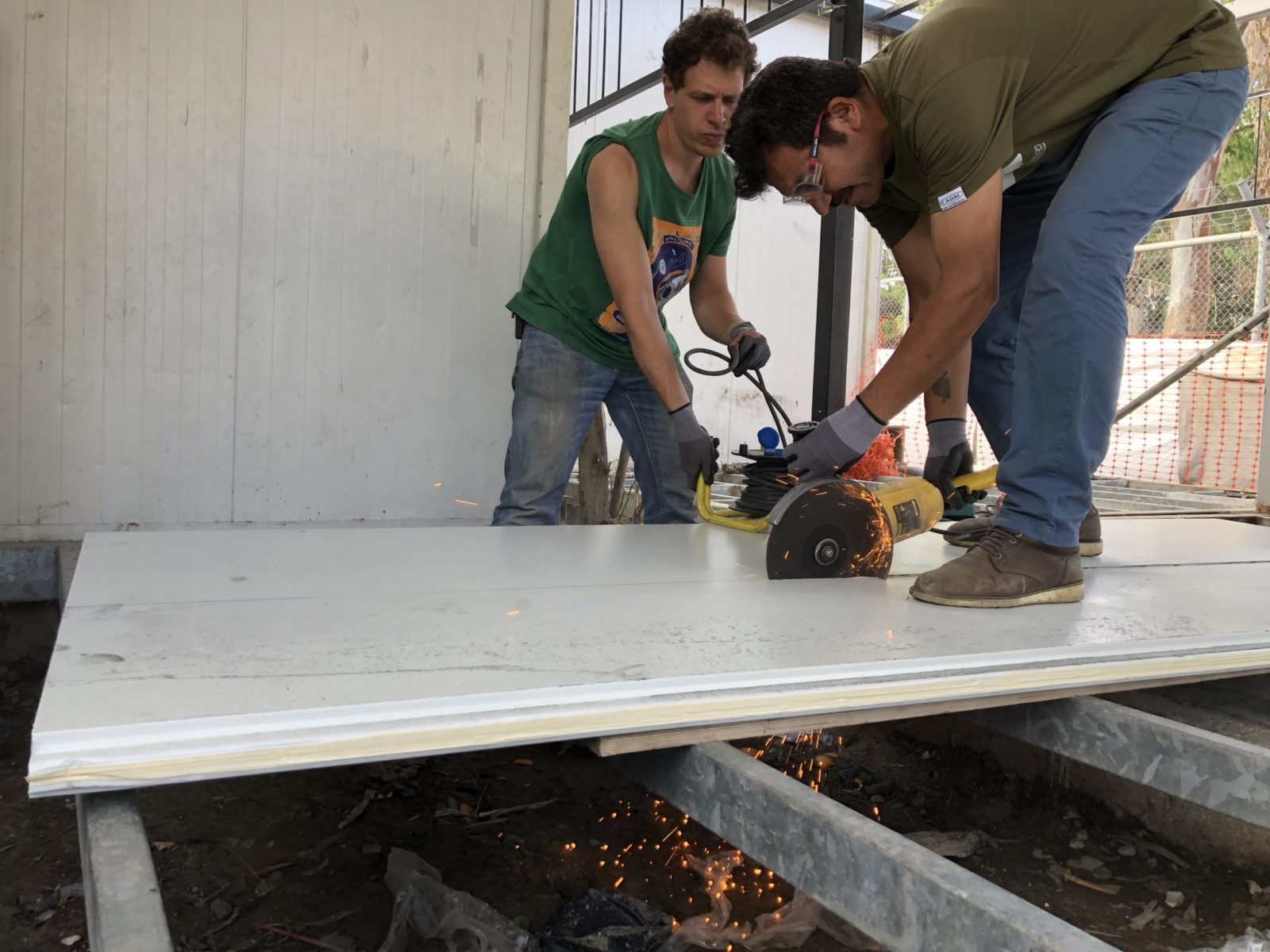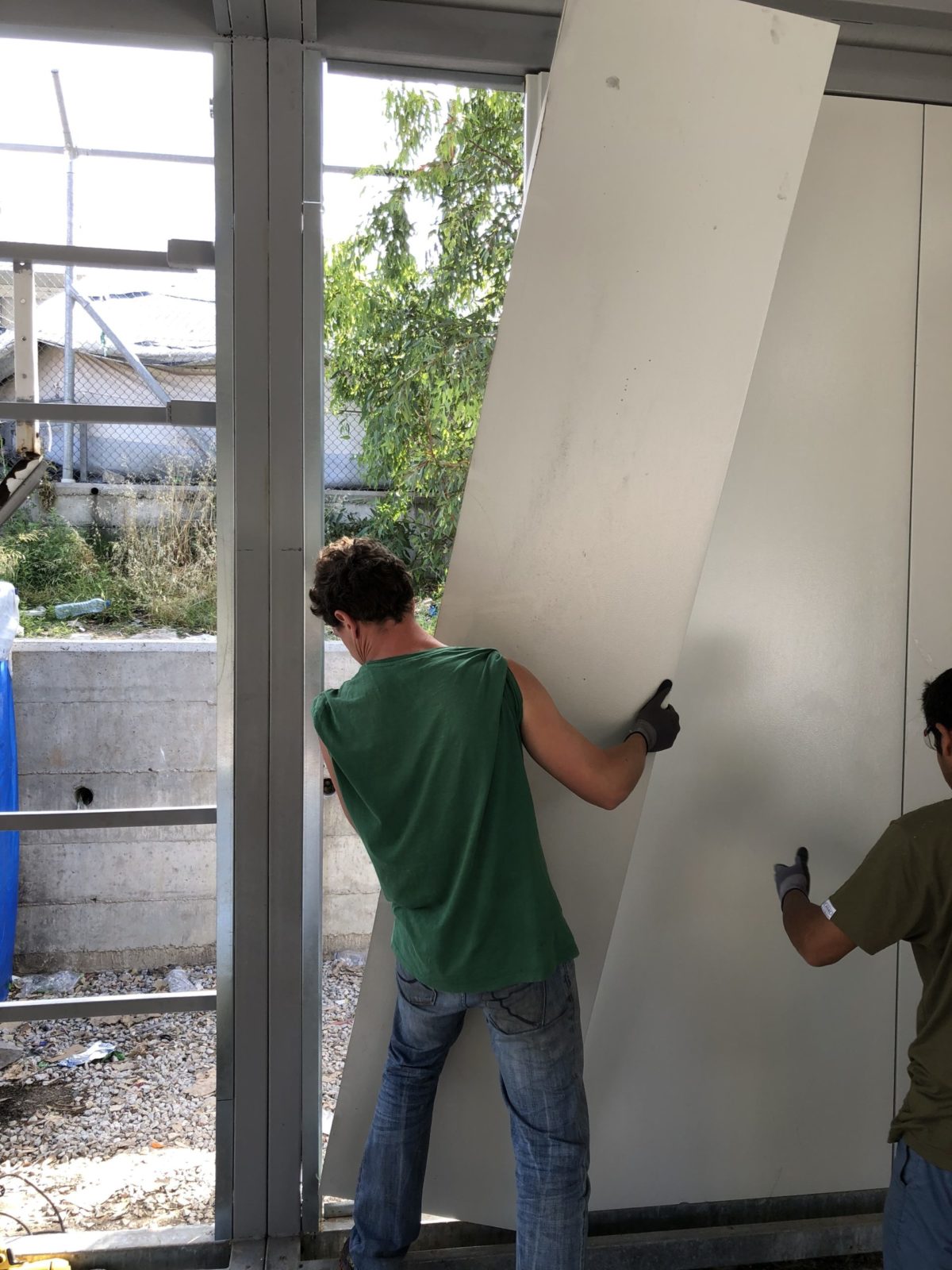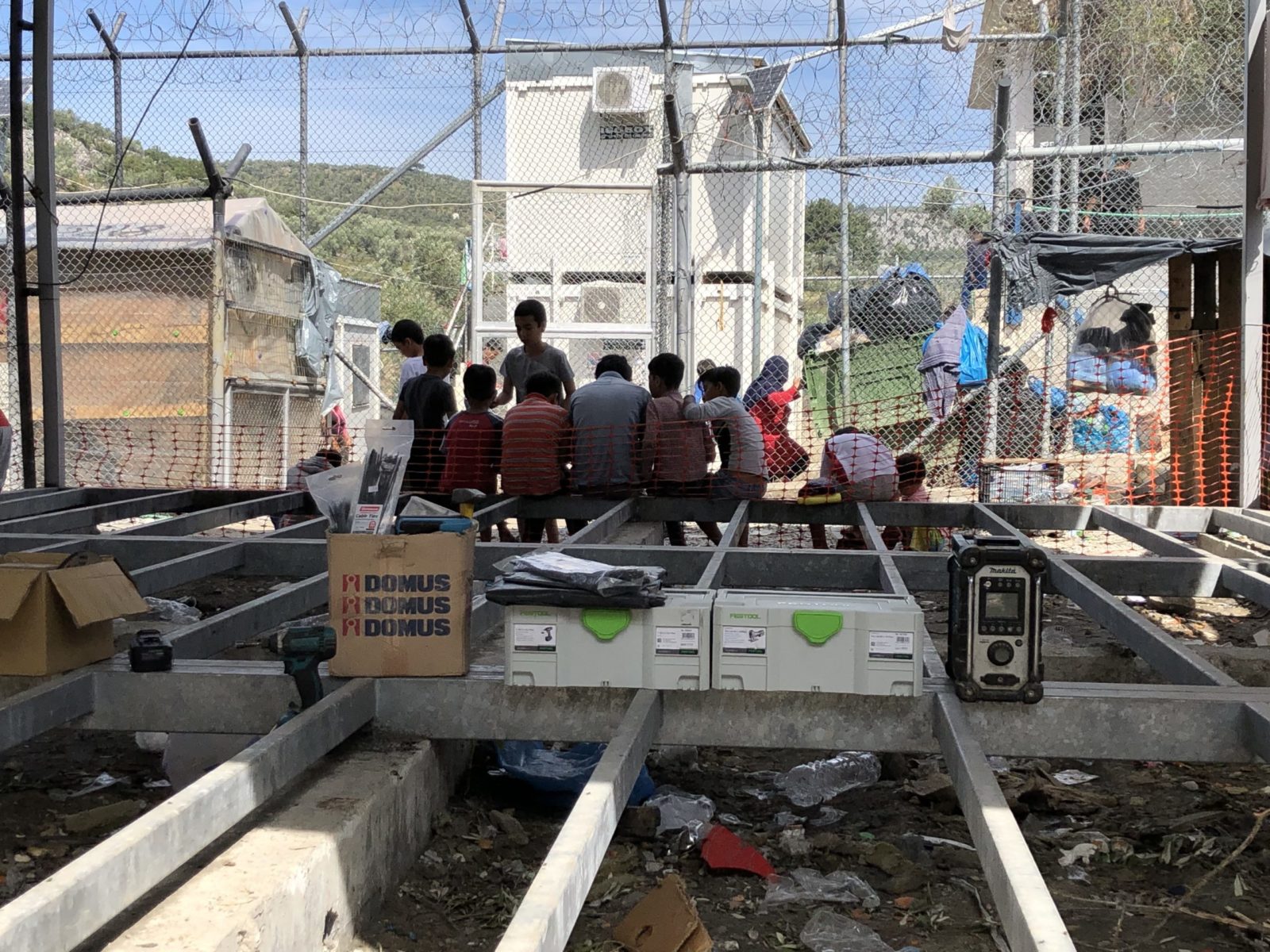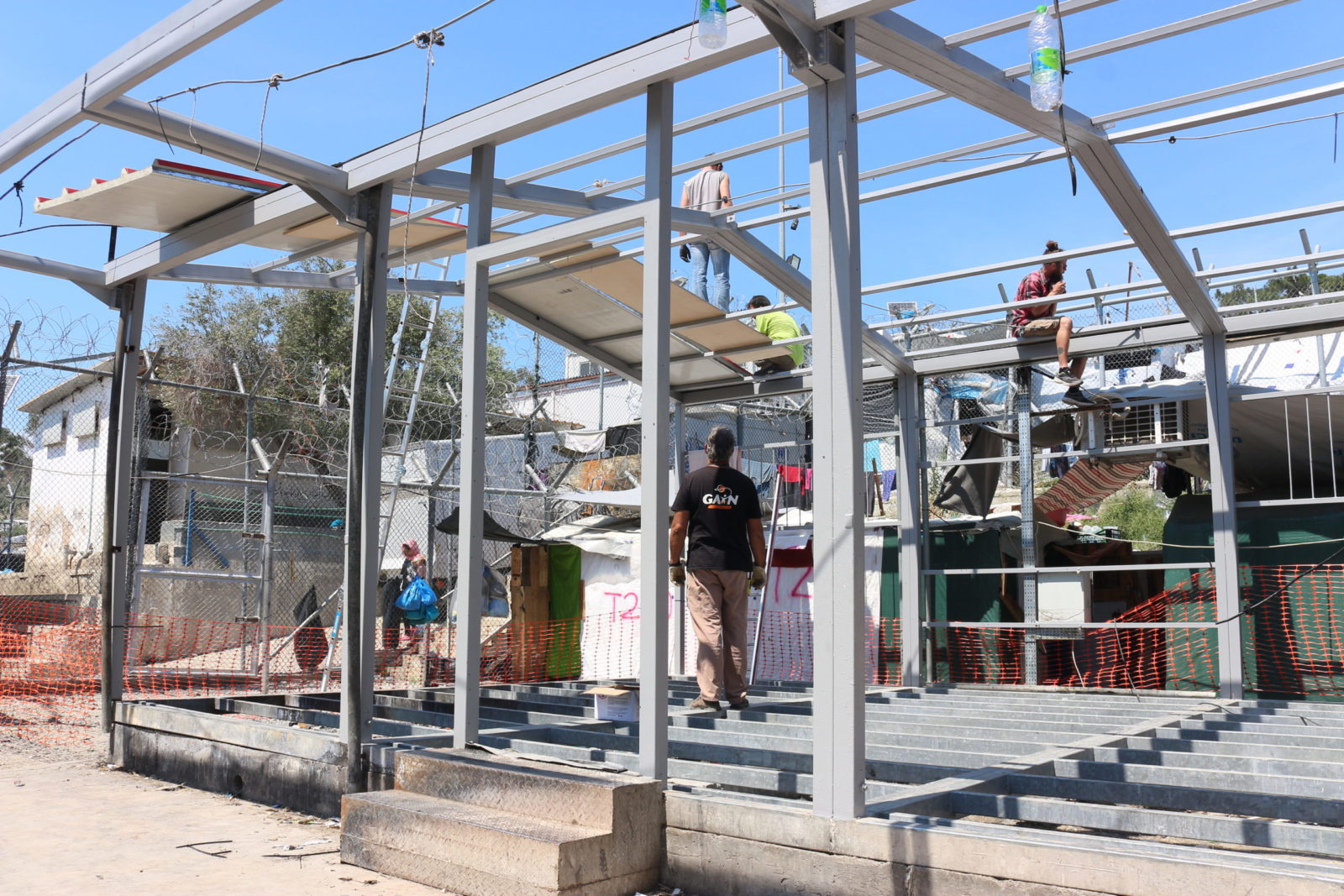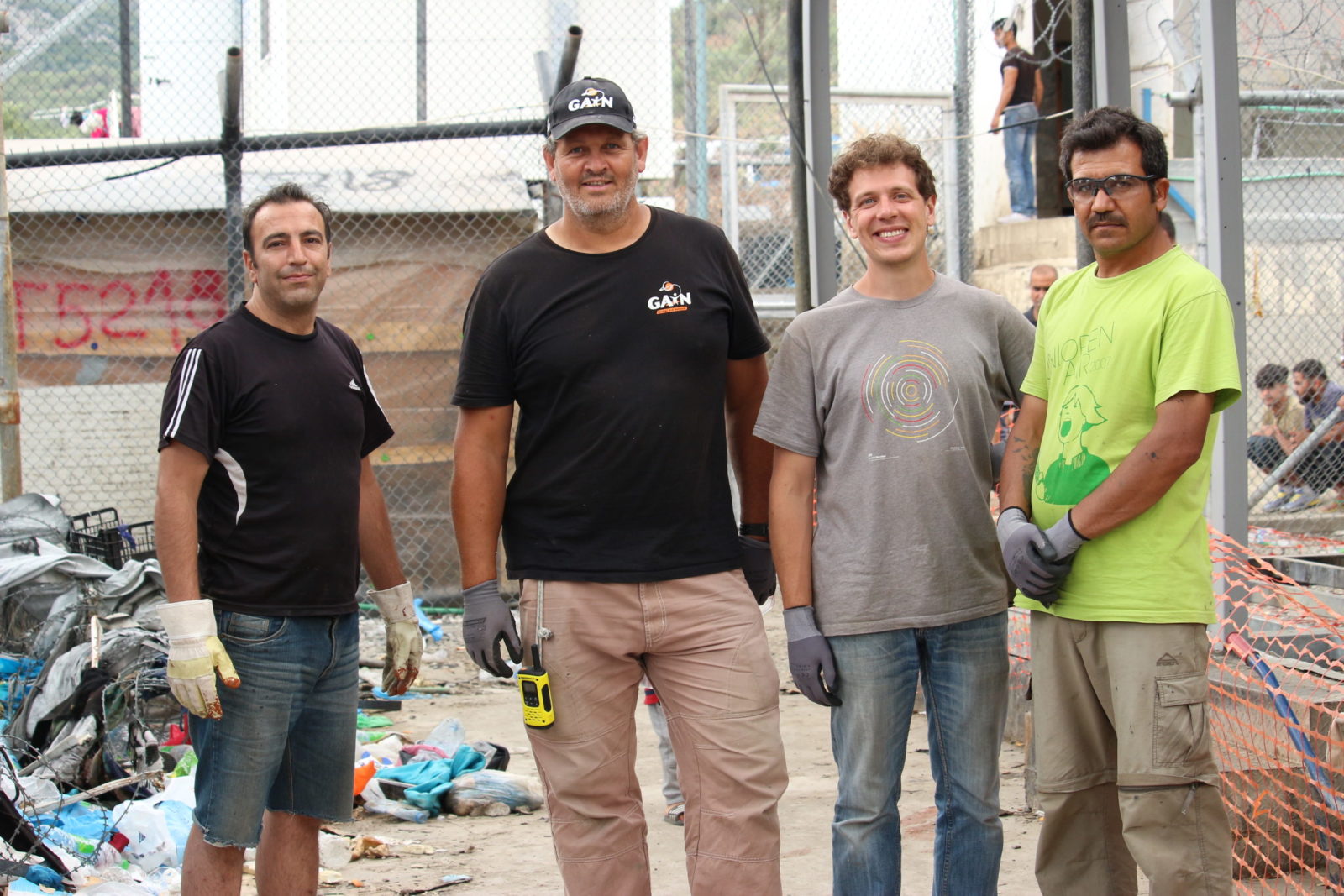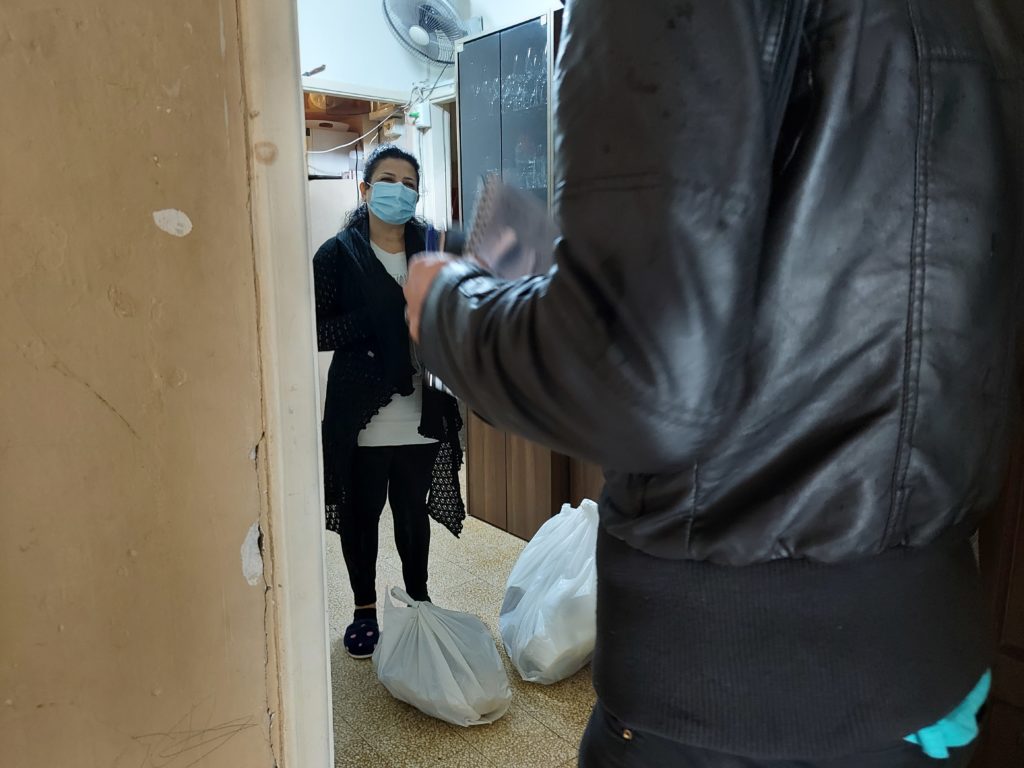
Out of the visits came meaningful interactions and conversations with hundreds of people. Hasnaa and her husband were one of those meaningful conversations. They shared their need with our partners, telling them how this pandemic has been hard on them as a family. The team prayed for them and shared the gospel message with them. Hasnaa and her husband expressed interest when they were invited by the team to go to church. “Hopefully, one day, after the lockdown is over, we will join.”
Our partners also had the opportunity to spend time with a lovely lady named Fadia, who lives with her son, daughter, and grandchildren. She shared that after the explosion her grandson started experiencing recurrent, unexpected panic attacks, requiring special medicines to help him cope. With the current state of the country’s economy, Fadia’s family was unable to afford to go to the doctor and buy the medicine from the pharmacy.
“You have no idea how much you’ve helped us by bringing us this food pack,” Fadia commented. “You’ve taken off some of our burden, really, thank you.”
Another meaningful conversation we had was with Salwa. It started off when the team received a frantic call from her, asking if they could urgently help her. She was so anxious while she waited, that she got very excited when she saw them heading toward her on the street., “You actually came! Other organizations would say they are coming but never show up, I’m just so happy you guys came to see my situation.”
Salwa explained that it had been months since she could afford to buy food. “You have no idea how much I needed this and how I appreciate this food you brought,” she said through tears.
While some of the team was talking to Salwa, another team member noticed a boy staring at him from inside, so he went to him. The boy was Salwa’s son. A team member sat with him and talked about basketball. The conversation moved to Jesus, how much Jesus loved him and that God has a great plan for him.
Salwa told the team that she was happy that they had a spiritual conversation with her and her son. She shared, “I want my son to grow up and be like you. [To grow up to] love God the way you all do and to help others.”
After prayerfully considering the situation in Lebanon and the people we are serving, our desire is to continue to provide until December 2021. We’ll continue to provide food packs for 400 families (an additional 100 families due to the worsening situation), medicine and medical treatment for those in need, along with minor house repairs, basic home needs like beds, mattresses, blankets, and appliances.
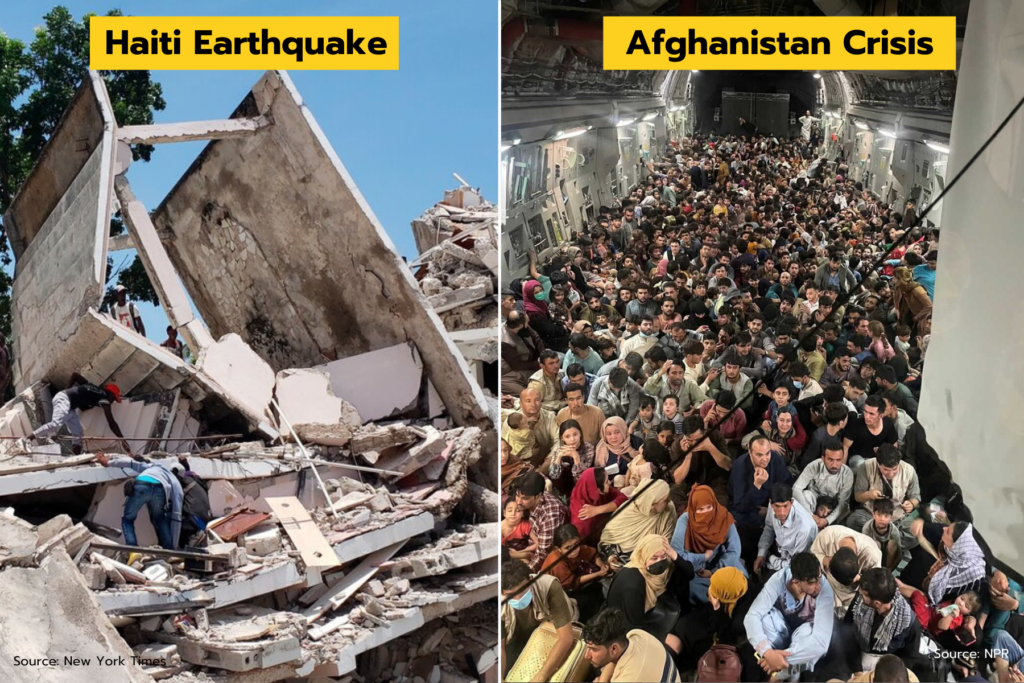
This past week has been heavy with grief as we are witnessing multiple global humanitarian crises in the news. Images of Haitians being surrounded by debris and rubble, following an earthquake that is reminiscent of the quake that devastated the country in 2010; and video footage of Afghans risking their lives to escape their country, after the takeover of the government by the Taliban; are just two examples of the harrowing realities that families and individuals are facing right now.
No matter the geographic location or type of disaster, the suffering of the people and the need for hope is evident. Global Aid Network (GAiN)’s mission is to reveal hope by sharing God’s unconditional love, and restore life by demonstrating the gospel through compassionate action to those who are living in poverty, injustice and crisis.
Haiti has had to endure back-to-back natural disasters, leaving people displaced, without food, water or shelter. The 7.2 magnitude earthquake struck on August 14, and Tropical Storm Grace swept the area just two days after, adding to the hardships of those already displaced. More than 2,000 have been reported dead, about 12,000 are injured and entire villages have been completely destroyed. These disasters came at a time when the country was already experiencing political instability and an increase in gang violence.
Meanwhile, the people of Afghanistan are facing great uncertainty and fear. On August 16, following mounting tension and conflict, the Taliban (radical Islamist movement) took power as the government collapsed. Civilian deaths were already on the rise before the latest incident. Now there is concern, particularly for women and children, who are most vulnerable and at risk of having their basic rights and freedoms taken away; and for Christians in the country that have their safety and lives threatened under Taliban rule.
With so much suffering, injustice and trauma, we are working to do what we can, through our local partners, to respond to these disasters.
In Haiti, we are working with a local church partner to provide immediate relief to families in need, through relief packages. This includes water, food, medicine, and temporary shelter materials.
At the same time, we are connecting with like-minded groups to support the body of Christ in Afghanistan, both during this immediate and uncertain time, and for those who escape from the country.
The people of Haiti and Afghanistan are desperate and in great need of the hope and protection that Jesus can provide.
Will you join us in demonstrating God’s love through prayer and compassionate action to the people of Haiti and Afghanistan?
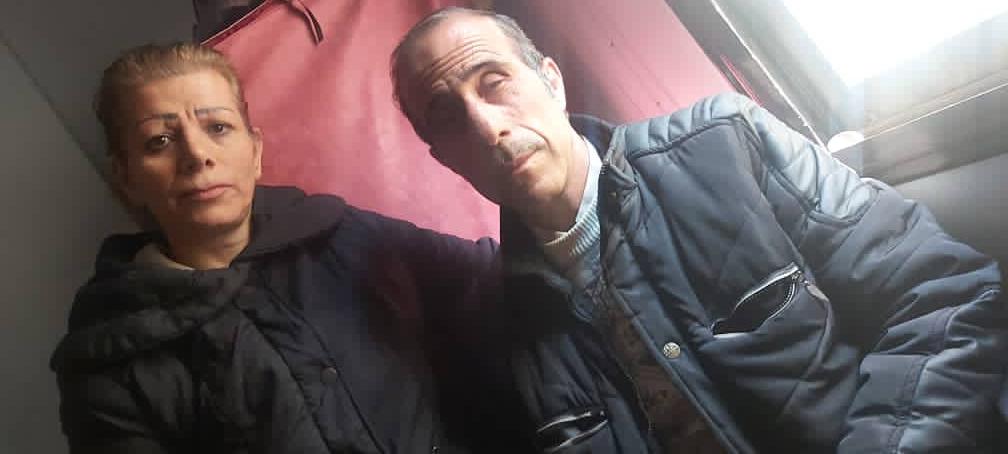
March 2021 marks the 10 year anniversary of the Syrian war. Since the civil war started in 2011, more than half of Syria’s population has been displaced, according to a statement by Canada’s Minister of Foreign Affairs and the Minister of International Development.
“Over half of Syria’s pre-civil war population is now displaced, and more than 13 million people inside the country need urgent help,” the statement said. “The conflict has resulted in one of the world’s worst humanitarian crises.”
This past decade has caused so much pain and suffering for individuals and families in Syria. According to UNICEF, many families have had to flee from violence multiple times (up to seven times).
The economic impact of the war has meant that many families are struggling to afford or even get access to basic food items for their households. Many have lost their jobs and 90 per cent of people in the country are living in poverty, according to the BBC. Due to a lack of access to food, over half a million children under five years old suffer from stunting.
GAiN has been involved in Syria since 2013, partnering with a local church in Damascus to help provide basic food and non-food items through Bags of Blessings. Each bag provides for a family of five for one month. For those who have received bags in the past eight years, not only has the aid helped alleviate the financial burden, but displaced families were also connected to the local church where they were introduced to the love of Jesus.
While the war seems to be slowing down and has stopped in the majority of the country, Syrians are still facing the economic consequences.
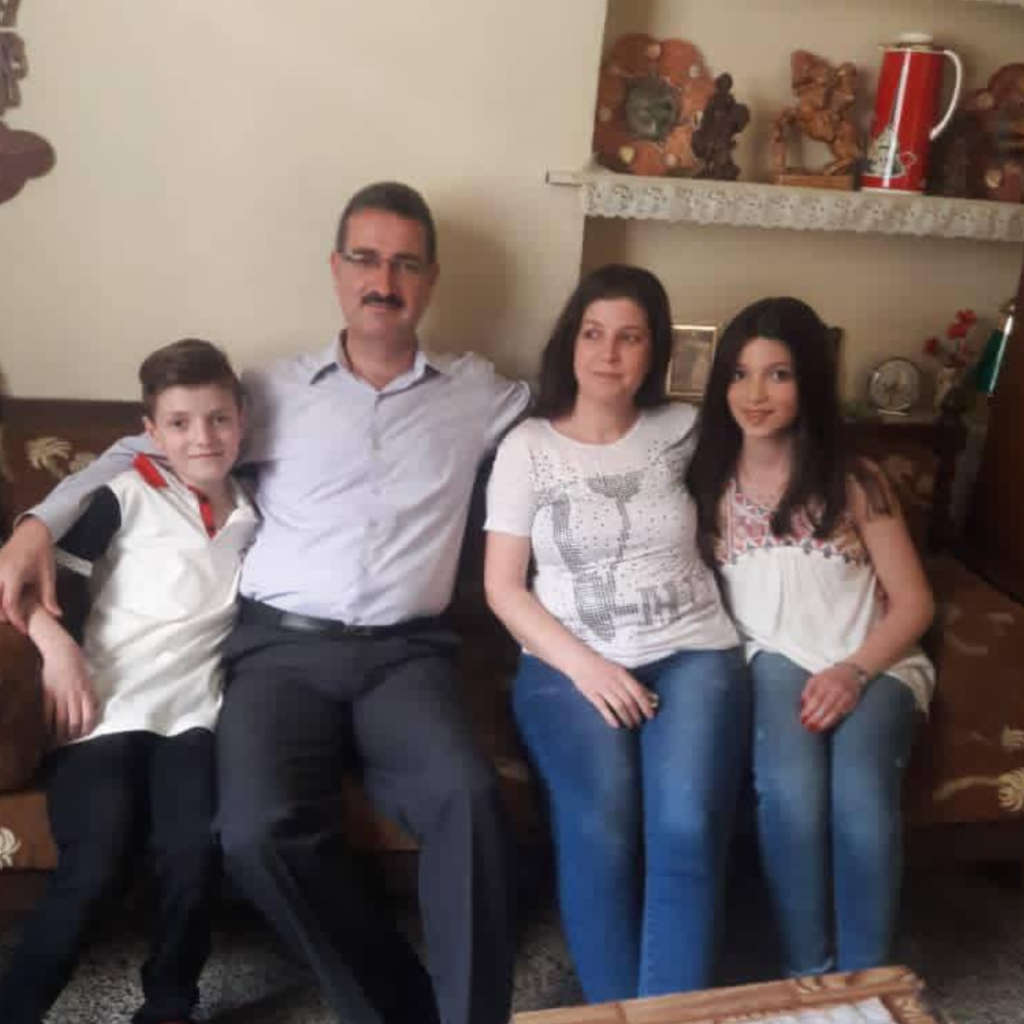
Lynn Maksoud, a member of the church who is involved in the high school ministry, shared how the struggle to find basic food items has made life difficult but the Bags of Blessings are helping them get by.
“I have been attending the church for over five months. [I am] grateful for the Bags of Blessings they offer to us because it meets our needs. All of us know that the economic situation is very difficult during this period. Unfortunately, the war left destruction but it is then concluded. But now, it seems there is no end for the need. The prices are very high and we can’t buy many things like before. People’s situation is getting worse. So, the Bags of Blessings are very helpful for us, they even include many things we can’t buy right now. So, it is very important, more than any time before. Thank you for your help.”
For many church members, they initially came to the church to receive Bags of Blessings. While they were able to receive aid, many people came to know Jesus through an invitation to attend church meetings. Nadim, a husband and father of three school-aged children, is one of those people.
“I came to the church asking for the Bag of Blessing because we are, as a family, in need. My wife and I are working but that’s not enough for living expenses. I put all my salary to buy my monthly medicine. I came to the church asking for help and started to attend the meetings. I [came to know] Christ as saviour, then I got baptized, and now I am attending all the meetings in the church. I am so happy, although the situation is critical and harsh. I thank the Lord for the church because it is still with us, giving the Bags of Blessings. That bag really helps a lot with the expenses. The need was big during the war and now it is very huge.”
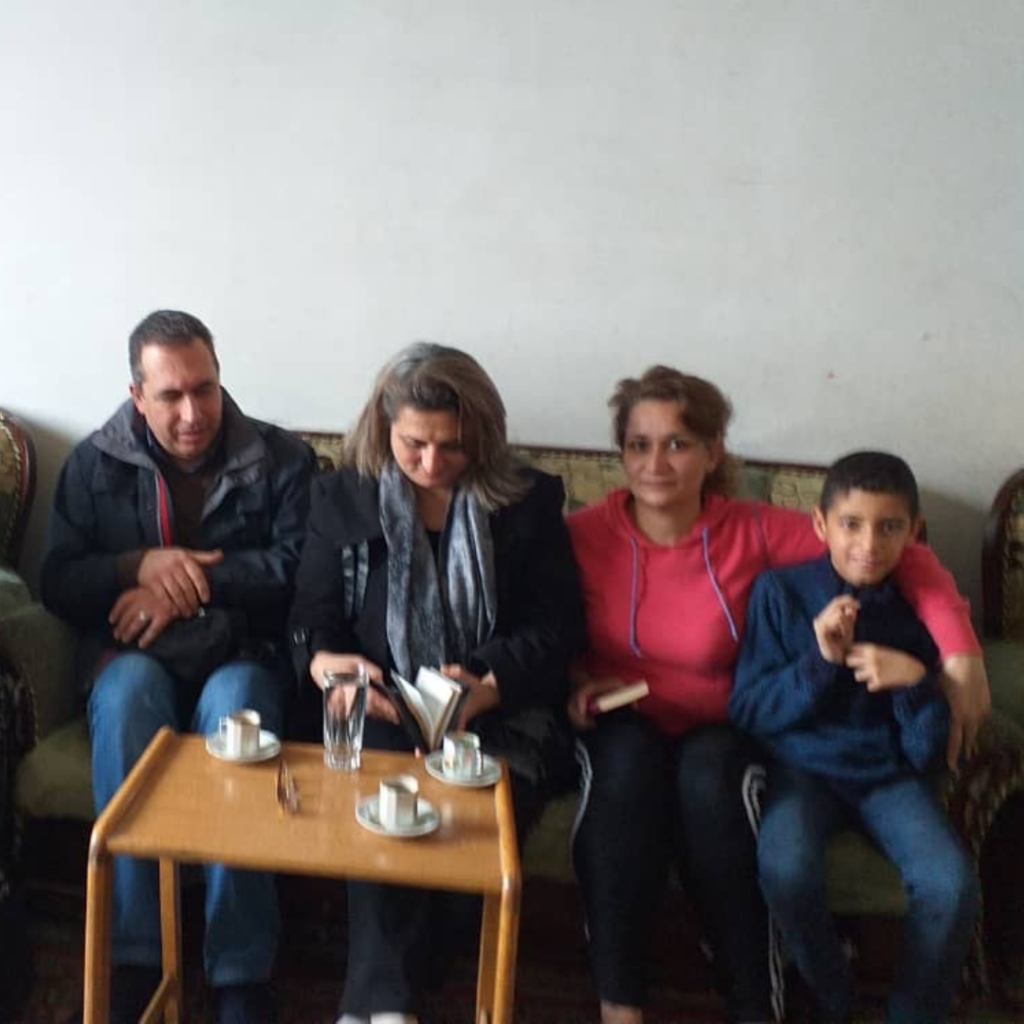
Earlier this year, Syria entered its 10th year of civil war, just as COVID-19 became a global pandemic.
Since 2013, we have worked with local partners to provide aid and the hope of Jesus to displaced individuals and families whose lives have been forever changed since the war, including 13.1 million in need and 6.6 million internally displaced (UNHCR). Our Bags of Blessings program (distributing bags with a month’s worth of food and non-food items) has helped alleviate some of the financial burdens since inflation and unemployment has made it hard for families to put food on the table.
When COVID hit and restrictions meant that churches were unable to gather in large groups, our faithful partners continued to dedicate their time to visiting families door-to-door. They delivered over 955 Bags of Blessings and 100 Clean Bags (containing basic cleaning and disinfecting supplies) to help raise awareness and prevent the spread of the virus.
Dina A., is a wife and mother of three adult children. She is a member of the local church and started attending when she received Bags of Blessings through the program.
Life before COVID was already hard, but the added impact of the pandemic is causing more stress on her family’s situation.
“My husband is a retired policeman and he isn’t earning much,” Dina explained. “My eldest daughter is 32 years old and is dealing with chronic health issues that require her to be on medication and go to the hospital for regular examinations. My youngest son is 20 and currently in university. My other son is 31 years old but has not completed his education in order to earn more and help us with household expenses.”
Due to inflation, whatever they earn isn’t enough. While life remains difficult for Dina and her family, the Bags of Blessings help make a difference and continue to serve as a reminder of God’s faithfulness.
“I serve God at the church and help package and distribute Bags of Blessings. The Bags touch my heart and fill it with gratitude to the Lord, because He is a good and faithful shepherd. The Bags definitely attract new members to the church and are given according to the need, so that it will be a reason for blessing everyone who takes it with knowledge of how the Lord is good.”
Faddaa S., is another member of the church who first heard about it through the Bags of Blessings program.
“The economic situation at home, because of the general situation and the deteriorating conditions, is below the middle line because of the high cost of living. We live on my salary, which does not exceed $25 dollars (per day),” Fadaa, 46 years old, shared.
“When we heard that the baptist church distributed Bags of Blessings, I began attending. This was the reason we came at the beginning. But then, I became attached to the Word of the Lord and I began to think of the benefits (Bags) as gifts from the Lord Jesus. The Bags have helped lift a large part of our expenses that we used to spend on purchasing food. Now we use that money on other household expenses.”
Families with younger children are finding it difficult to get by. Rana K. is 38 and part of a family of four.
“We can no longer provide for the needs of our children in a healthy and ideal way for their ages,” Rana lamented. “They are in the stage of development.”
Despite the hardships, Rana still has faith.
“The love of the Lord Jesus is beyond our imagination. We find Him with us in every moment of our lives, with joy and pain. We find that the Lord will provide us with our needs at the right time when we are most in need of help. Personally, I do not fear any need because I have an inner peace that my master never leaves me in need. As for the Bag of Blessings, due to the current situation in our country, some people come to the church for the purpose of aid, but when they hear the word of the Lord and enter the minutes of the Lord, you will find them adhere to the word of the Lord and apply it in their lives.”
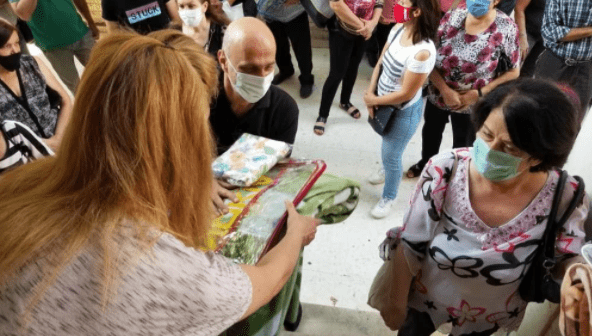
Just like many other countries, Syria enacted lockdown measures when the COVID-19 pandemic hit. Restrictions on gatherings made things difficult for our local partners, who usually host large church gatherings and need to meet with people in order to distribute Bags of Blessings (bags with essential food and non-food items).
Still, they adapted to make it work, including holding bible studies over Zoom and meeting in small groups to share God’s word, as well as distributing Bags of Blessings and cleaning supplies to families door-to-door.
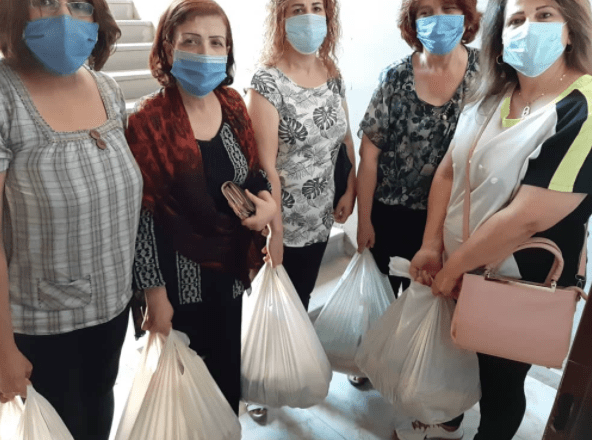
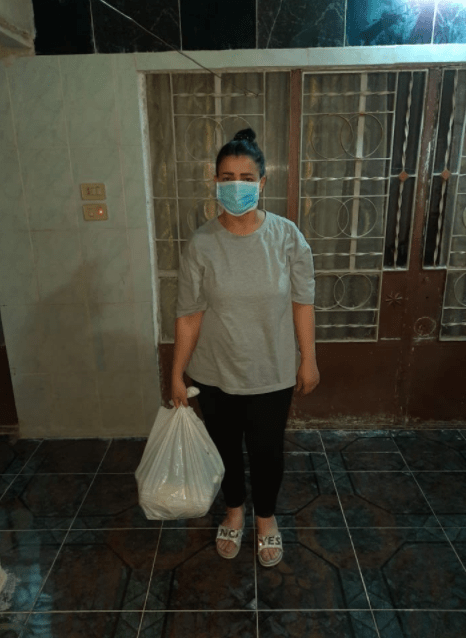
Bags of Blessings have been much-needed since the country’s economic crisis has left many families impoverished. With inflation, the cost of even the most basic food items have become unaffordable for many families. To make sure that people are still getting these essential food and non-food items during the pandemic, our partners made personal door-to-door visits to families, providing them with Bags. This act of kindness, along with intentional love and care, has helped many families make a decision to follow Jesus, and many are now in discipleship groups.
Our partners also distributed Bags of Blessings and Clean Bags (with cleaning products), as well as blankets and bed sheets for the winter, at a local church, taking advantage of the church’s big parking space to ensure proper distancing.
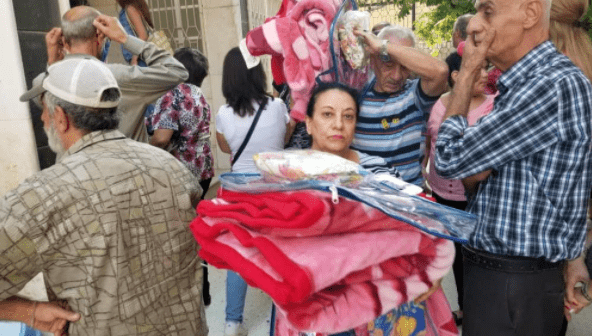
The pastor of the church thanked our partners, saying, “I am very thankful for the help you are granting to our church. These [Bags] are becoming a very good support for their needs, knowing that all the materials (food, detergent, clothes) are very expensive due to the sanction over Syria, and the inflation of the currency (our Lira). For that reason, there is a strong need for our people in Syria in general to be supported and to grant them to and thanks to God for the generous relief program you are doing. This ‘love in action’ is the core of Christianity and the message of real love, which is translated to caring [for] and helping [each other]. And I see through this holy program a strong and good testimony for our Lord Jesus Christ.”
Nadia, who received a Bag at the distribution, wrote a thank you letter, sharing her appreciation: “Thank you and we appreciated so much because you were next [to] us during all these crises and you didn’t leave us at all. You were good support for us by sending food, detergent, blankets, etc. Thank you. Because of you, I understand what it means by Christian family and the church… We learned from you to search in deep in bible and love others from our heart and [care for] and help people like us.”
In the last three months, our partners have been able to reach 300 families, helping 123 make a life-changing decision to become a follower of Jesus, and leading 13 follow up groups.
Global Aid Network (GAiN) sent a DART (Disaster Assistance Response Team) to Lesbos, Greece to spend two months at Camp Moria. One of their projects was to rebuild a structure that had burned down in March 2020. Because of a shortage of volunteers, due to COVID-19, the DART team helped rebuild the structure (called Level Two).
Below is a story written by Melinda, a DART member:
As soon as we start working a crowd of kids starts gathering and wants to help. Men and women walk by, either giving us curious looks or asking in, more or less, broken English what we are doing.
“When is it done?”
“We don’t know. A few weeks.”
A few weeks to rebuild two burnt structures in camp.
The fire happened two months ago and a lot of families lost their shelter. The families that lived inside the two isoboxes but also the families living in self-built structures around it. One child lost its life.
Omar*, a 15 year old boy from Afghanistan lives with his mother and siblings only a few meters down from where the fire happened. He tells me that the fire broke out in the morning. An accident. The mother of the little child was standing in the food line to get breakfast for them when the fire started. Her husband was already in Germany and the two of them on their long journey to reunite with him. But the reunion of the father with his little child will never happen. The little one died in the fire.
Omar also tells me that the fire truck couldn’t even make its way to the location. The paths in camp are too narrow for a big fire truck. Women and children were running away from the fire while men were bringing water to extinguish the flames. It is a miracle that the fire was stopped by buckets of water. The trees standing around still have black trunks.
A few families have already built new structures around the burnt skeleton of an isobox. Even though the land is valuable no one has settled inside the left behind ash-black beams. Local NGOs had to fight for that. Now no family has to be told to remove their shelters while we are rebuilding.
“Do you think it is good that we are rebuilding the isoboxes?”
“Yes!” Omar says. “Then families can move here from the jungle,” as the olive groves around the official camp are called. “That’s good. They will even have a shared bathroom and electricity here.”
Omar helps us today scraping off the bubbled paint and soot off the beams. He’s excited to be able to help and also practice his English with us. During lunch a beautiful woman comes and brings us Afghani pastries. Kids and adults tell us thank you for doing the work and rebuilding.
We feel well taken care of.
“Will you be back tomorrow?”
“Yes, tomorrow and the day after tomorrow and almost every day from now on until this shelter is finished.”
In addition to rebuilding the burnt structure, the DART team also built an isolation station for potential COVID patients to quarantine, in the event of an outbreak at the camp.
Melinda shared a few thoughts just before the station was about to open:
The isolation station from MSF (Doctors Without Borders) is now officially ready to be opened. As we drop off the last few things for the ‘isolation kits’ every patient will get upon arrival, a group of 15 cleaners is roaming around, sweeping up the last sawdust and picking up the last bits and pieces that show that up.
Until today, this place was a full-on construction site. The electricians fix the last light switches, the water tanks get filled with water, the project manager is on the phone and looks tired, stressed, but still content. While all of this happens, medical personnel get their tours in groups of 15, do a walk through from low risk area to high risk area, walk into the changing rooms and take a look at the wash facilities for the future patients. It feels like a buzzing beehive.
Tomorrow is the opening. And while people are excited that everything seems to be done in time, the hope is that this facility will never have to be used. Or at least never to its full capacity. That only very few of the isolation kits will ever be handed out. The paradox of building a corona isolation facility: putting in so much work under time pressure with the hope and prayer that it will never be needed.
Story and photos by Pau. A. (Written on May 26, 2020)
One of the valuable contributions the DART (Disaster Assistance Response Team) is bringing to camp Moria is additional experienced personnel and good quality equipment. This week, from Monday to Wednesday, we are helping our partner EuroRelief to distribute hygiene packs to 2.000 families.
Most of the hygiene packs were donated by UNICEF. We also have refugee volunteers from Team Humanity to translate and give directions to families, while EuroRelief and GAiN are coordinating the distribution. It’s amazing to see four aid organizations come together for such a necessary thing as it is hygiene inside camp.
While the rest of the team is still working on the construction project, Marie-Jose is probably bringing back memories from the DART mission in Iraq as she is taking care of registering and keeping track of the families being helped during the distribution. Meanwhile, Anais is standing under the hot sun guarding the queue and receiving tickets, while showing unconditional love with her big smile and nice conversations, probably without understanding a word. Moreover, our distribution equipment is making things much easier for dealing with the crowds.
“It’s the first time they give me this,” says Farid*, a young Afghan man who arrived at Moria six months ago with his family, “just once they gave us soap, now they are giving us this box, but I don’t know what’s in there.” Every box includes two 10L collapsible water containers, one bucket, 12 soap bars, a self-powered torch, child potty, multipurpose cloths, reusable menstrual pad kits, sanitary pads, a safety whistle, underwear and laundry detergent.
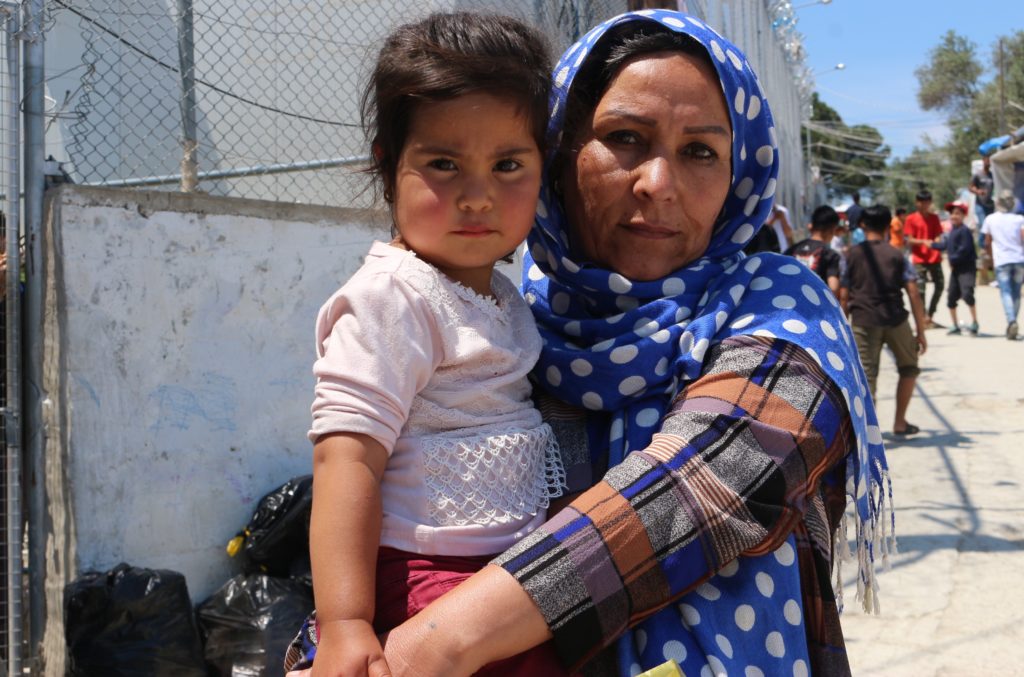
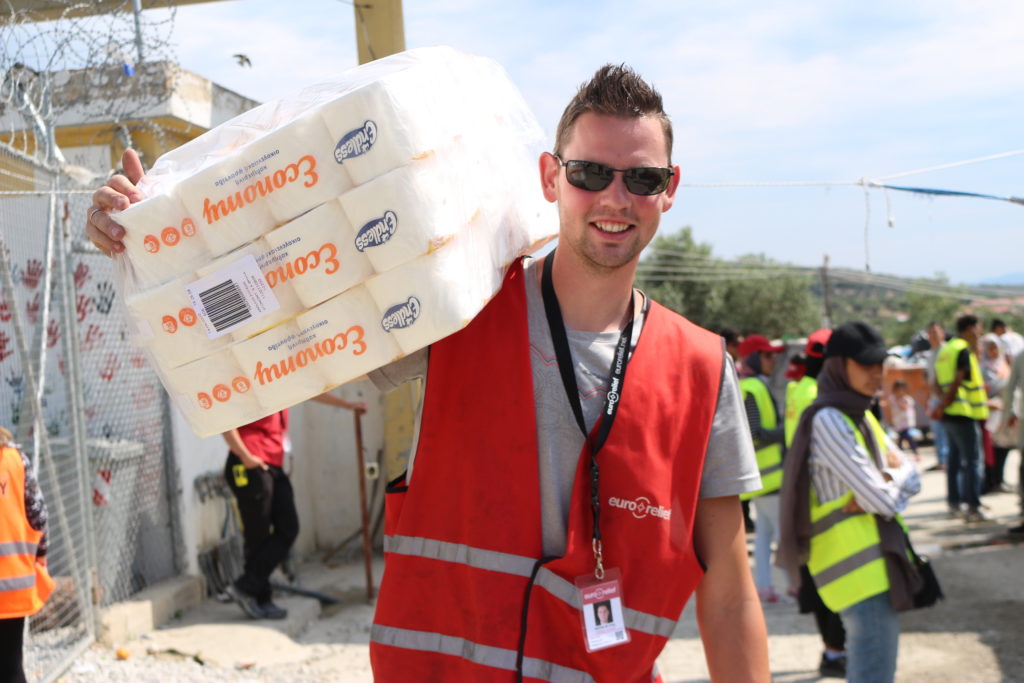
Zahra* is an Afghan woman in her fifties who came five months ago, now living with her husband in a tiny house made of reeds on top of the area called The Jungle. Where she lives “there is no washroom, no facilities, nothing,” therefore they need to walk for a while to reach one. They try to keep clean and take hygiene measures during coronavirus times with the “few” products they have. “Two times they gave us soap,” she recalls, “but the other times we buy it ourselves.” The last time they received soap was “two months ago.”
These families also affirm using only water for washing when they run out of soap and other products. But water is also a big problem inside Moria. “Because now the weather is so hot, every day we should take a shower, but we don’t have (enough) water to do that,” explains Fatimah*, an Afghan teenager raised in Iran who has come to the distribution on behalf of her family. “Because of coronavirus we should wash our hands, but we don’t have water, what should we do?”
Fatimah is so right. Sometimes, Moria camp feels like a never-ending steeplechase race.
*Names changed for security reasons
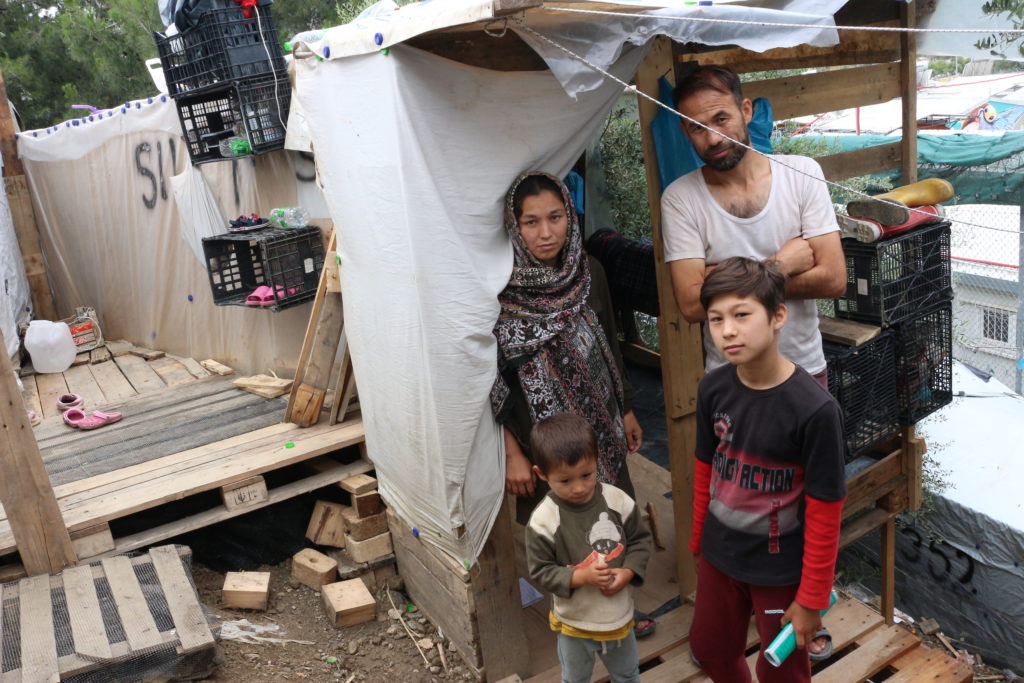
Story and photos by Pau A.
It was about 8:30 a.m. I was looking for a family nearby when I suddenly stumbled upon one of the most pleasant spots I have been in camp Moria. It was at the heart of camp, but it felt like stepping into a small countryside piece of land. Maybe because of the steep ground and pines around it, or maybe because the structures and paths to this place were so narrow that it made access very hard and it seemed to create a kind of microhabitat which was not as overcrowded and loud as other areas within the compound. Probably that is the reason why Darvish* and Sakine* left The Jungle and moved here with their two sons.
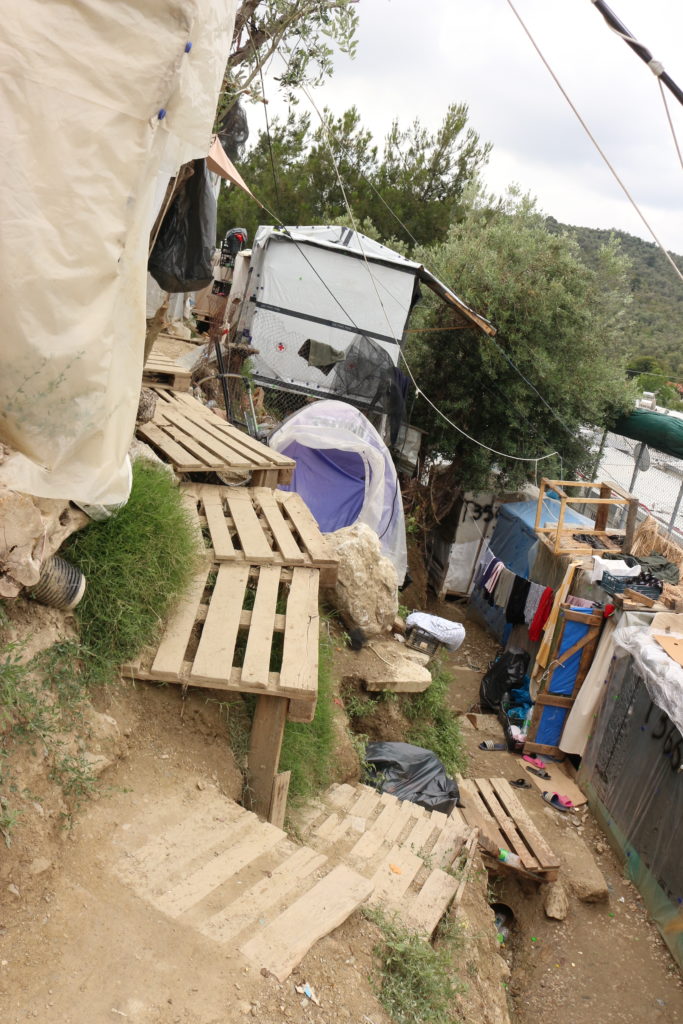
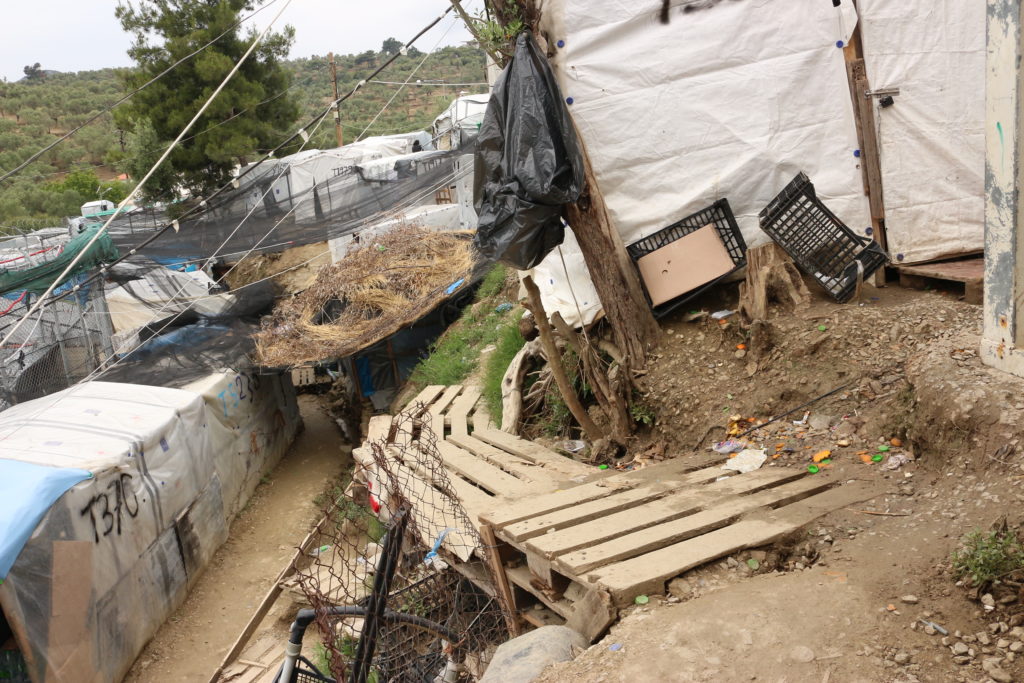
I was taking pictures of these fascinating pallet paths and the hanging houses supported by wooden beams, when Darvish came out of one of them and greeted me with the biggest of smiles. His place looked very nice (if compared to the standards of Moria), half of it was their house, and the other half was a wooden terrace that was kept clean and mostly empty, contrary to most house entrances here.
I asked Darvish with my hands if I could take a picture of his house, and he, also with his hands, replied, “Yes, of course!” When I was done, he again said some words I didn’t understand, but with his gestures and looking at the inside of his house, I knew for sure he was inviting me for breakfast with his family. First I refused, just for being polite, but he didn’t need to insist much before I happily accepted the invitation. This home and the family I had in front of me just brought me good feelings.
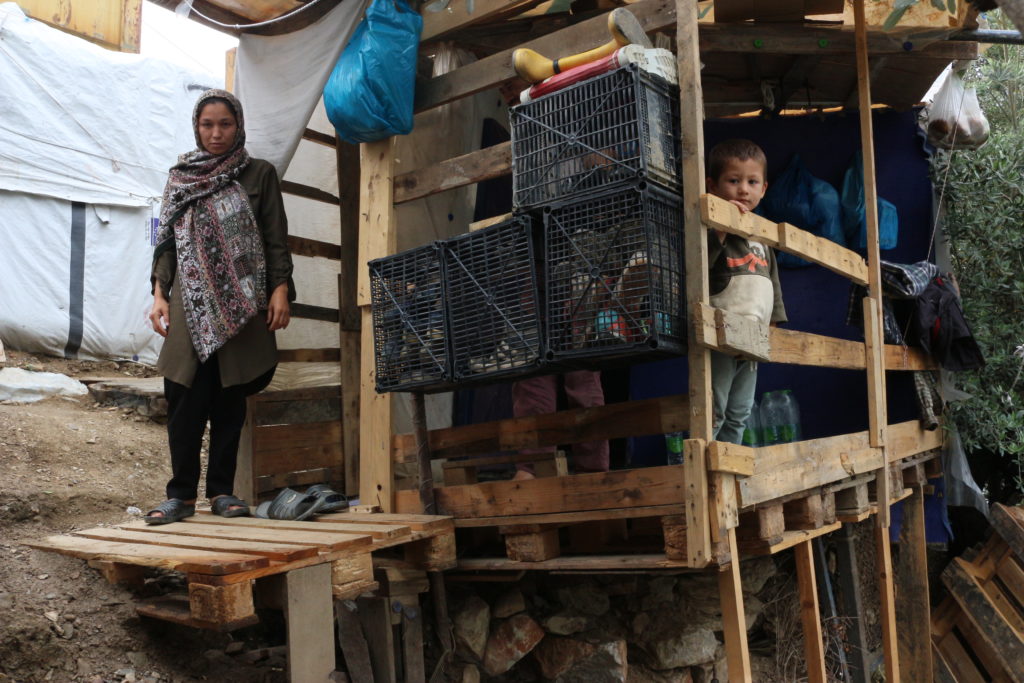
Once inside the structure, Sakine and her two boys asked me to sit down and share breakfast with them. It was a nice family breakfast without any hurries, just seating, eating and enjoying the sunny morning. I felt privileged to be part of it.
We ate pita bread that Darvish brought from the distribution, and also bread from the Afghan ovens on Baker Street. Before I could realize, I already had a cup of milk at my right. Sometimes we tried to speak about our countries, football, and other topics with the help of Google Translate. Sometimes the oldest son of about six years old tried to speak the little English he learned in class with me, and then teach it to his father. Sometimes we would just eat, drink and enjoy each other’s company, as if we had known each other for a long time.
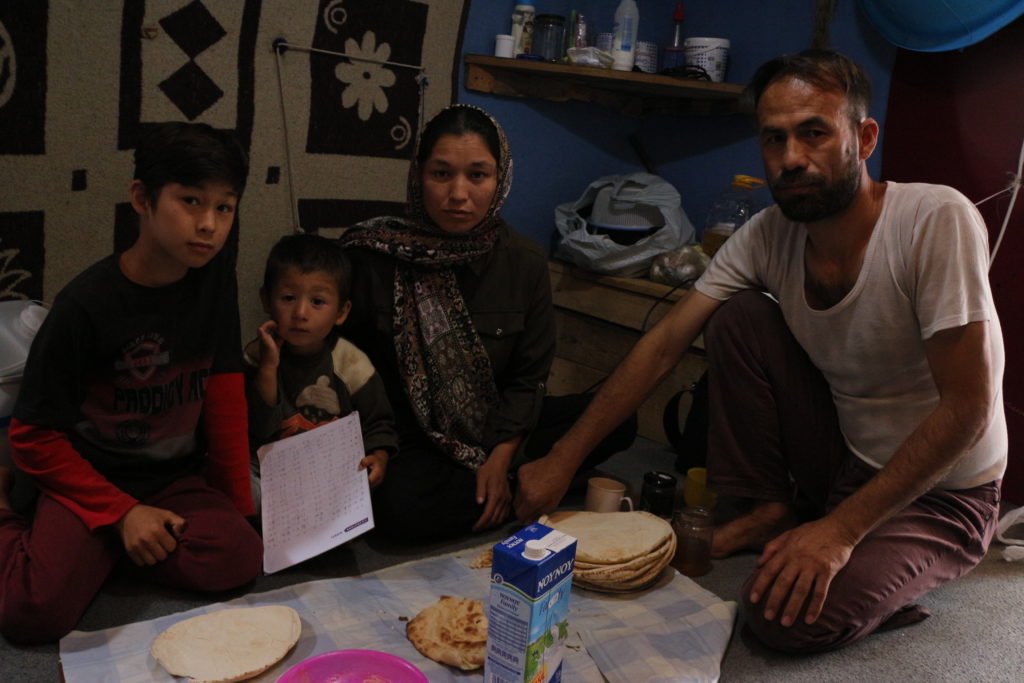
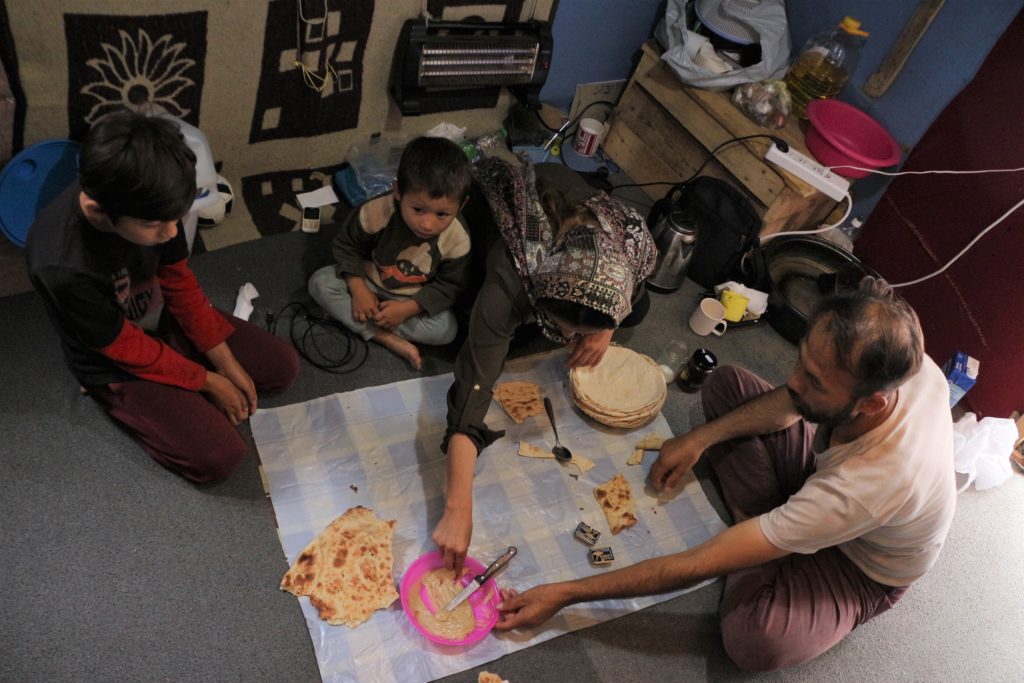
I would have stayed there all morning if I could, it just felt so comfortable in the heart of one the most uncomfortable places I have ever been. This kindness and hospitality from many refugee families in camp never ceases to amaze me. I cannot remember any words or specific conversations during our nice and peaceful breakfast. But I will remember the kindness, the smiles, the thankfulness, the warm welcome. Yes, the warm welcome. Kind of ironic when coming from a refugee family in Moria, isn’t it?
This experience made me rediscover that most of the time, words are not needed to express very valuable things in life: kindness, appreciation, acceptance, etc. How much more we should share the love and hope we have received from God in such a way that words are, actually, not that much needed.
* Names changed for security reasons
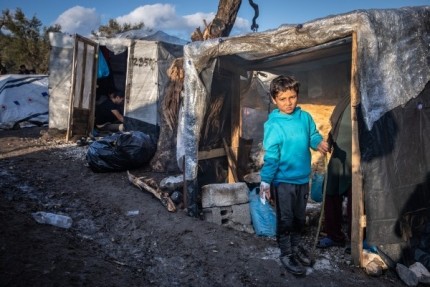
Story by Angelika S.
There are places you would never choose to call your home. There are lives you would never choose to live. There are destinies you would never choose to experience.
All of these seem to be combined in a place called Camp Moria: 17,000 to 20,000 people crammed together in a place designed for not more than 3000, the smell of decay hanging in the air, overflowing garbage bins everywhere, children playing in the dirt, people queueing up for hours for getting food, taking a bath or getting medical help.
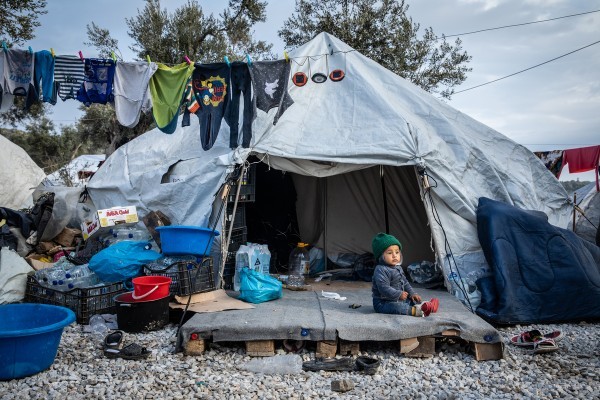
When you take a walk through the camp you can look into thousands of faces, faces that are marked by the traumatic experiences they have survived. The list of these experiences is long: war, armed conflict, violence, civil unrest, starvation, persecution, human loss, loss of belongings and much more. The stories behind these faces may be similar, and yet they are so unique. Every single person in the camp has his or her own story and this story had a personal impact on his or her life. There may be despair, hopelessness, depression, or even anger or aggression.
And this is what the camp reflects at first glance: an atmosphere of darkness, lifelessness, and low aspirations. People’s lives have been torn apart, left with only the debris of their dreams they once wished to live, like a forest burned down by a devastating fire.
Yet, if you have a closer look, you may also see something else. In the midst of all the rubble there are beautiful flowers making their way through the ashes.
Someone has made a tiny, beautiful garden around his hut, paving a path of white stones from the gate to the entrance of his hut.
In the same neighbourhood someone has created an idyllic archway to his hut decorated with plants and flowers.
A small girl dressed like a princess gives you a bright smile when you pass by and wave at her.
A mother is sweeping in front of her home, which is tiny and poor but neat and clean.
A family of six invites you to their home that consists of one single room. They have prepared a “table“ with tea, biscuits, and their national sweets. An atmosphere of love and generosity welcomes you. They are interested in your life, your family and your background. ‘You are always welcome to visit us‘, they tell you as you leave them to continue your walk through the camp.
In the midst of the darkness there is light, in the midst of the rubble of broken dreams there is hope, in the midst of the ashes of torn lives there is beauty. But we have to open our eyes to see this. It may not be visible at first glance or on the surface—it can only be seen when you take a deeper look, when you look beyond the obvious.
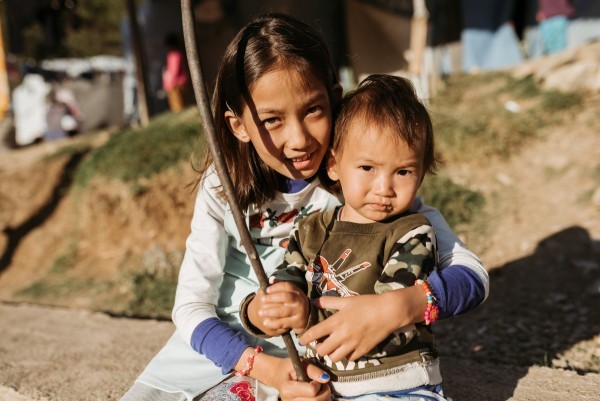
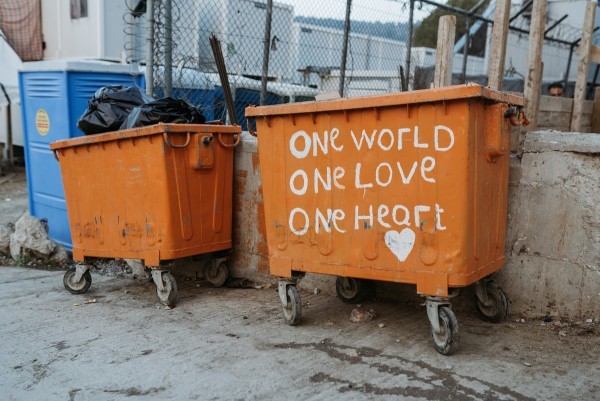
This is also true for our own lives. There may be hardships, there may be pain or loss; still it is not our surroundings that determine our lives, but the way we deal with them. We can make the ashes of our lives blossom and bring forth a beauty that cannot be compared with anything else.
Together, we can help provide communities like Moria with food and other necessities during this time, as well as help prevent and slow the spread of COVID.
WILL YOU PARTNER WITH US?
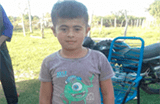
Felipe*, 10 years old, lives in Abai, Paraguay with his parents. When missionaries named Susana and Alejandro visited his grandmother’s home, he learned about the opportunity to go to a nutrition centre, run by Jesus Responde, Global Aid Network’s partner in Paraguay. At the nutrition centre, children from impoverished backgrounds can come weekly, receive nutritious meals, receive tutoring and learn about Jesus.
Before going to the nutrition centre, Felipe disobeyed his parents and showed very little interest in his studies. Despite already being in third grade, he didn’t know how to read or write.
Felipe is now in fourth grade. His mother commented that she has been congratulated by Felipe’s teacher because his behaviour has notably improved. Not only that, but he can now read Bible verses correctly, thanks to the care and attention he has received from the nutrition centre. This has impacted Felipe’s entire family and has opened the door for his parents and grandfather to all receive Christ in their hearts.
Soon, they are expected to take the next step of being baptized.
Susana, the missionary, commented that their church has grown and that they are extending the services they offer at the nutrition centre to provide more meals. Through children like Felipe, we can see how the simple service of providing food can allow encounters with their families and the opportunity to share the love of Christ with them.

